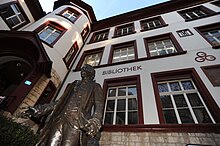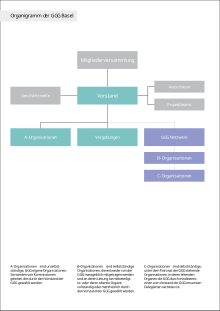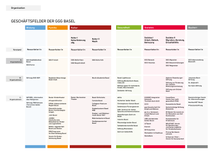Society for the good and non-profit Basel
| Society for the good and non-profit Basel (GGG Basel) |
|
|---|---|

|
|
| legal form | society |
| founding | March 30, 1777 |
| founder | Isaac Iselin |
| Seat | Basel , Switzerland |
| purpose | Promotion of cultural diversity, access to education, equal opportunities and helping people to help themselves in Basel. |
| Employees | 180 |
| Volunteers | over 200 |
| Members | over 4000 |
| Website | www.ggg-basel.ch |
The Gesellschaft für das Gute und Gemeinnützige Basel , GGG Basel for short , is a private association in Basel that is involved in the areas of education, family, culture, social affairs and health. The GGG runs 12 of its own companies and over 60 organizations are under its patronage (as of 2020). Over 2000 volunteers and employees work for the GGG or in the immediate vicinity.
history

founding
The association was founded on March 30, 1777 by Isaak Iselin and other members of the Basel section of the Helvetic Society as a society for encouraging and promoting the good and the common good . The purpose was to promote the education of the underprivileged sections of the population and to alleviate widespread poverty. Comparable Enlightenment societies that still exist today emerged at the same time in other cities such as Hamburg ( Patriotic Society of 1765 ) and Lübeck ( Society for the Promotion of Charitable Activities ).
According to the founding statutes of 1777, the main purpose of the society is: "The promotion, encouragement and spreading of everything that is good, that is praiseworthy, that is not for profit, that can increase and increase the happiness of citizens and people in general a right to the attention of society. "
18th century - work and education instead of handouts
Isaak Iselin saw promoting the education of underprivileged sections of the population as a means of alleviating the widespread poverty in Basel. The focus was on the establishment of training institutions according to the motto “helping people to help themselves”. Among other things, the first sewing school was founded in 1779, in which girls learned to read, write and arithmetic, in 1780 the first daughter school was founded and in 1784 the paper school, which was attended by factory children (today GGG courses).
Founding (not exhaustive):
- 1779 Call for proposals for poverty reduction ideas
- 1779 First sewing and mending school
- 1780 First daughter school
- 1784 paper school (for children working in paper mills, today GGG courses)
19th century - ahead of the state
Due to the lean structure, the wide-ranging relationships and the level of awareness in the active bodies of Basel, the GGG was able to act more flexibly in contrast to the state, show new paths and support disadvantaged groups in an uncomplicated manner. The GGG Basel often played a pioneering role, be it in promoting school education for girls and working-class children or in founding libraries for broad sections of the population.
After the daughter's school, which was founded in 1780, was closed for reasons of economy, a second daughter's school was founded in 1812, which was taken over by the state in 1819 (today the Leonhard high school ).
In 1807, the founding of the youth library took up a fundamental concern of Isaak Iselin: imparting knowledge and education through the promotion of reading as "one of the most effective means of promoting the happiness of the individual as well as promoting the prosperity of society". In 1823 and 1842 the offer was expanded to include the citizens 'and workers' libraries. Nowadays the GGG City Library is GGG Basel's largest own institution.
Founding (not exhaustive):
- 1807 youth library (today GGG city library )
- 1809 Interest-bearing savings fund (today the SKB 1809 Foundation)
- 1812 Second daughter's school (today Leonhard high school )
- 1821 GGG New Years Gazette
- 1855 First workers' apartments (GGG own properties)
- 1867 Music School (today Basel Music Academy )
- 1898 Foundation for the Blindenheim Basel
20th century - GGG as the third force between state and economy
With the emergence and consolidation of the welfare state and the legal regulations governing the legal entitlement of individuals, the state became more and more involved in institutions and initiatives of the GGG Basel in the 20th century and took over the (co-) financing of public tasks. The GGG has been concerned with the relationship to the welfare state since its emergence, since the question arose in which areas it should be active and where, on the other hand, the state fulfills its mandate. An analysis by the sociologist Franz Hess in the 1960s showed that private interventions were necessary “where the public sector does not intervene, be it because only a few are affected, be it because the financial consequences went too far, be it for other reasons." As a private association, the GGG tries to step into the breach where the market fails and the state does not (yet) intervene. The cooperation between the GGG and the state has become closer over time and is always subject to the political conditions in the grand council as part of the subsidy negotiations . In 1981 and 2002 the mean value of the state contributions to the GGG was just under CHF 4.5 million, around 90% of which was used to run the city libraries.
In 1988, the then head of the department, Jaqueline Schmid-Chastang, questioned GGG's ability to innovate as the administrator of so many institutions and saw the motto “ahead of the state” threatened. The workload of the voluntary board members is too great to be innovative. As a result, the office was professionalized in 1990 and Niklaus Merz became the first full-time managing director.
Founding (not exhaustive):
- 1958 Jugendhaus Foundation (now the summer casino )
- 1962 GGG advice for foreigners (today GGG Migration)
- 1979 GGG signpost
21st century - GGG innovative
Innovation and staying innovative is also the theme of the GGG in the 21st century. In the 2015 annual report, the then headmaster Thomas Bein reported on the challenge of finding the balance between valuable tradition and constant renewal. The board of directors set up an innovation committee and decided to hold a recurring innovation conference in order to re-bundle the innovation potential that has always existed in the GGG. The decision was subsequently implemented and the first innovation conference was held in 2017. Among other things, the conference reported on the idea of an “IT coach plus”, an initiative designed to support people who have difficulties finding their way in an increasingly complex and digitalized world . The pilot project GGG Digi Coach emerged from this idea at the end of 2018.
Founding (not exhaustive):
- 2001 GGG educomm (dissolution and transfer to the canton of Basel-Stadt 2018)
- 2013 GGG Kulturkick (promotion of young cultural workers)
- 2014 look @ work (advice on problems at work)
- 2015 Opening of the new GGG city library in Schmiedenhof
- 2015 project - GGG host families for refugees
- 2016 Online Guide to Social Basel
- 2016 Info getting older
- GGG Digi Coach (in the pilot phase)
structure
Association GGG Basel
The Society for the Good and Non-Profit Basel (GGG Basel) is organized as an association. The highest body is accordingly the general assembly, which meets once a year. The honorary board of the association consists of ten members elected by the general assembly: the 7 heads of department, the delegates of the board, the treasurer and the clerk. The managing director, who heads the office of GGG Basel, is appointed by the board.
The purpose of the association is "to promote, encourage and spread everything that is good, that is praiseworthy, that is not for profit [...]" , promotes equal opportunities and is committed to human dignity and cultural diversity. The geographic scope is limited to Basel .
Business areas
The association is involved in the areas of education, social affairs and culture. This includes business areas of education, family, culture, health, social affairs and the builder who is responsible for GGG's own real estate. A board member is responsible for each business area.
Organizations
Two different types of organizations are represented in society: Own companies (A organizations) and patronage organizations (B and C organizations), which form the “GGG network”.
A organizations
These are dependent GGG-owned institutions, whose strategic management is the responsibility of voluntary commissions. They are elected by the board of the GGG. The A-organizations with their own employees are operationally managed by professional managers. The twelve own companies include:
- GGG retirement settlement Bläsistift - independent living in old age
- GGG Atelierhaus - support studio for visual artists
- GGG Benevol - Center for Volunteering
- GGG Freizeit - Support of leisure activities for children from families with a financially restricted situation
- GGG Kulturkick - funding agency for young cultural workers
- GGG courses - language courses
- GGG Migration - contact point for migrants. Competence center for integration
- GGG Neujahrsblatt - promoting knowledge of history about Basel
- GGG Stadtbibliothek Basel - Providing books and other media to the population of Basel and the surrounding area for information, reading promotion, further education and entertainment.
- GGG tax returns - help with filling out the tax return for German-speaking taxpayers in the canton of Basel-Stadt.
- GGG Voluntas - support in the event of illness, advice on living wills
- GGG Wegweiser - Infothek for social Basel, typing, support with difficulties at work (look @ work)
B organizations
These are independent institutions that are largely supported by the GGG and / or in which the society participates in its management or whose supreme bodies are fully or mostly elected by the board of the GGG. These include:
- Music Academy Basel
- Room exchange for students
- Kinderfreund Foundation (social housing)
- Lighthouse Basel Foundation
- Basel Blind Home Foundation
- Various other patrons
C organizations
These are independent institutions that are under the patronage of the GGG and for whose governing bodies the board of the GGG provides at least one delegate. These include:
- Boys' Choir Basel
- Girls' Choir Basel
- Basel Sinfonietta
- Street kitchen Basel
- Little table cover yourself
- Parents emergency number
- Alzheimer's Association of both Basels
- Various other patrons
GGG as a funding institution
In addition to its own organizations and the sponsoring organizations, the GGG awards grants for projects in the fields of culture, education, family, social affairs and health. The board of directors, which processes around 300 applications annually, is responsible for the allocation of funding. Funding applications can be submitted via the GGG Basel website. The general assembly decides on grants over CHF 50,000, and the board of directors can decide independently. Every year GGG Basel awards around CHF 6 million in funding. In 2018, for example, CHF 3.6 million (60%) of this went as operating contributions to the company's own GGG organizations and CHF 2.4 million as funding contributions to organizations and projects in the GGG network (B and C organizations) Recipients outside of the immediate GGG environment. This could benefit u. a. the Basel youth culture festival , the Surprise association , the Pro-Juventute Basel and many more.
financing
In 2017, around 5.7 million CHF were distributed for charitable purposes (contributions to A, B & C organizations and project support). The GGG finances these activities through donations, bequests , own income, membership and patronage contributions. In addition, there are state contributions that go directly to the organizations concerned.
In order to be able to successfully continue the social and cultural commitment in the future, the association has set up the “Isaak Iselin Support Group”.
literature
- Becher, Jörg: From Christoph Merian to the Zolli patrons. In: Tageswoche from February 2, 2012. https://tageswoche.ch/gesellschaft/von-christoph-merian-bis-zu-den-zolli-goennern/ , accessed on April 22, 2019.
- Braunschweig, Sabine: The GGG in the 20th century. The importance of the “society for the good and the common good” in the cultural, social and economic Basel. 195th New Year's Gazette. Schwabe Verlag Basel 2017.
- GGG Basel (Ed.): The 238th Annual Report of GGG Basel - GGG Annual Report 2015. Steudler Press AG, Basel.
- GGG Basel (Ed.): The 240th annual report of GGG Basel - GGG annual report 2017. Steudler Press AG, Basel. 2018.
- GGG Basel (Ed.): The 241st annual report of GGG Basel - GGG annual report 2017. Steudler Press AG, Basel. 2019.
- GGG Basel (Ed.): Insight November 2019. Steudler Press AG, Basel 2019.
- Janner, Sara: GGG 1777-1914. Basel city history as reflected in the «Society for the good and the common good». With a contribution by Hans Ulrich Fiechter ( New Year's Gazette of the Society for the Good and Charitable Basel 193/194). Basel 2015/2016
- Karle, Monika: My commitment to the GGG - Interview with Gabi Mächler project manager GGG Digi Coach and President GGG Wegweise. In: Insight No. 26 November 2018. https://www.ggg-basel.ch/fileadmin/ggg-basel/docs/GGG_Basel__Einblick_Nr._26.pdf Accessed on April 22, 2019.
- Miaskowski, August von: The society for the promotion of the good and non-profit in Basel during the first hundred years of its existence. Basel 1877.
- Siegfried, Paul : History of the non-profit society in Basel from 1777–1926: Festschrift for the 150th foundation celebration . Basel 1927.
Web links
- Website of the Society for the Good and Charitable Basel (GGG Basel)
- GGG signpost
- Patronage organizations of the GGG Basel
Individual evidence
- ↑ GGG Basel (ed.): Annual report 2017 of the Society for the Good and the Charitable . Steudler Press AG, Basel 2018, p. 14th f .
- ^ Organizations of the GGG Basel. GGG Basel, accessed on April 15, 2019 .
- ^ GGG Basel: Statutes of the GGG Basel. (PDF) GGG Basel, August 2007, p. 2 , accessed on April 21, 2019 .
- ↑ Jörg Becher: From Christoph Merian to the Zolli patrons. In: day week. February 2, 2012, accessed April 22, 2019 .
- ↑ Braunschweig, Sabine: The GGG in the 20th century: the meaning of the "society for the good and non-profit" in the cultural, social and economic Basel . Schwabe AG , Basel 2017, ISBN 978-3-7965-3661-8 , p. 94 .
- ↑ Janner, Sara: GGG 1777–1914: Basler Stadtgeschichte in the mirror of the "Society for the good and non-profit" (= New Year's Gazette of the GGG . No. 195 ). Schwabe AG, Basel 2015, ISBN 978-3-7965-3511-6 , p. 231 ff . (To the school foundations of the GGG Basel).
- ↑ Braunschweig, Sabine: The GGG in the 20th century: the importance of the "Society for the good and the common good" in the cultural, social and economic Basel (= New Year's Gazette of the GGG . No. 195 ). Schwabe AG, Basel 2017, ISBN 978-3-7965-3661-8 , p. 56 .
- ↑ Janner, Sara: GGG 1777-1914: Basler Stadtgeschichte in the mirror of the "Society for the good and non-profit" . Schwabe Verlag, 2015, ISBN 978-3-7965-3511-6 , pp. 238 ff .
- ↑ Janner, Sara: GGG 1777-1914: Basler Stadtgeschichte in the mirror of the "Society for the good and non-profit" . Schwabe Verlag, Basel 2015, ISBN 978-3-7965-3511-6 , pp. 253 (Isaak Iselin quoted in Janner).
- ↑ Janner, Sara: GGG 1777-1914: Basler Stadtgeschichte in the mirror of the "Society for the good and non-profit" . Schwabe Verlag, Basel 2015, ISBN 978-3-7965-3511-6 , pp. 252 ff .
- ↑ Braunschweig, Sabine: The GGG in the 20th century: the meaning of the "society for the good and non-profit" in the cultural, social and economic Basel . Schwabe AG, Basel 2017, ISBN 978-3-7965-3661-8 , p. 31 f .
- ↑ Braunschweig, Sabine: The GGG in the 20th century: the meaning of the "society for the good and non-profit" in the cultural, social and economic Basel . Schwabe AG, Basel 2017, ISBN 978-3-7965-3661-8 , p. 94 f .
- ↑ Braunschweig, Sabine: The GGG in the 20th century: the meaning of the "society for the good and non-profit" in the cultural, social and economic Basel . Schwabe AG, Basel 2017, ISBN 978-3-7965-3661-8 , p. 56 ff .
- ↑ GGG Basel: GGG Annual Report 2015 . Basel 2016, p. 10 .
- ↑ GGG Basel: GGG Annual Report 2017 . Basel 2018, p. 10 .
- ↑ Karle, Monika: My commitment to the GGG - Interview with Gabi Mächler project manager GGG Digi Coach and President GGG Wegweiser. (PDF) In: Insight No. 26 November 2018. GGG Basel, November 2018, p. 4 , accessed on April 22, 2019 .
- ^ GGG Basel: Statutes of the GGG Basel. (PDF) August 2007, accessed April 22, 2019 .
- ^ GGG Basel: Statutes of the GGG Basel. (PDF) August 2007, accessed April 22, 2019 .
- ↑ GGG Basel (Ed.): GGG Annual Report 2017 . Basel 2018, p. 14th f .
- ^ A b Patronage organizations of the GGG Basel. Retrieved January 11, 2020 (The Complete List of Patronage Organizations).
- ↑ Insight. (PDF) GGG Basel, November 2019, accessed on January 11, 2020 .
- ↑ Support group Isaak Iselin. GGG Basel, accessed on January 11, 2020 .

